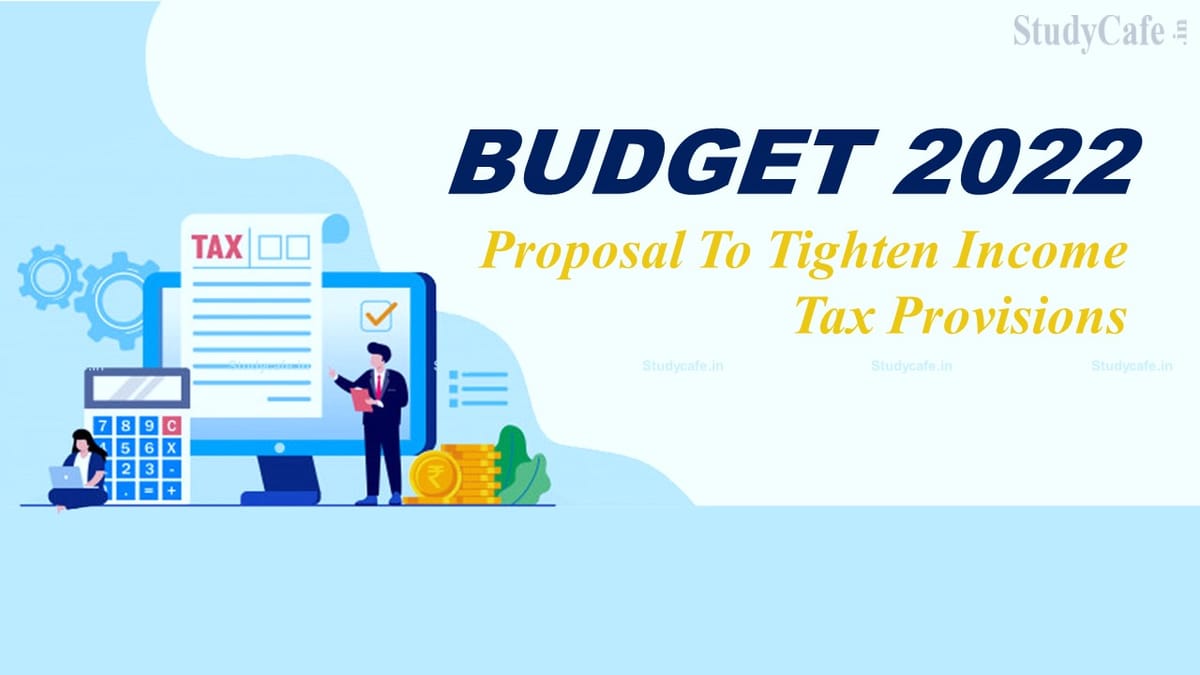Budget 2022: Four Proposals To Tighten Income Tax Provisions
Deepshikha | Feb 7, 2022 |

Budget 2022: Four Proposals To Tighten Income Tax Provisions
The Union Budget 2022 proposes several clarifying adjustments to tighten income tax legislation, which will take precedence over many judicial decisions. While this clarifies the income tax department’s position, it may cause complications for taxpayers who have previously claimed benefits based on judicial rulings.
Here’s a look at some of the ideas for tightening certain income tax laws that were proposed in Budget 2022.
No deduction shall be permitted in respect of expenditure concerning tax-exempt income, according to Section 14A of the Income-tax Act of 1961. Over the years, there have been disagreements about whether an assessee can be disallowed under section 14A of the Act if no exempt income has accrued, arisen, or been received during the financial year. The Central Board of Direct Taxes (CBDT) released Circular No. 5/2014 on February 11, 2014, clarifying that Rule 8D, coupled with section 14A of the Act, allows for disallowance of expenditure even if the taxpayer has not generated any exempt income in that year.
The Budget proposes to clarify that Section 14A shall apply and shall be deemed to have always applied in cases where exempt income has not accrued, arisen, or been received during the financial year and expenditure has been incurred concerning such exempt income to make the legislative intent clear and to avoid any misinterpretation. From FY 2021-22 onwards, the amendment would be in effect.
Individuals/HUFs will not be able to claim this deduction when completing their income tax returns for FY 2021-22 (the deadline is July 31 for individuals/HUFs without company income, unless the government extends the deadline).
Companies and other taxpayers claim a deduction under section 43B on the basis that converting interest payable on an existing loan into a debenture constitutes a constructive discharge of interest liability and so amounts to real payment, which has been upheld by many courts.
Such interpretation, according to the Budget plan, is contrary to the legislative intent. The conversion of an outstanding interest liability into debentures is not an actual payment and therefore cannot be claimed as a deduction under section 43B. This new rule will be effective from FY 2022-23.
Certain taxpayers (for example, pharmaceutical corporations) have been claiming deductions for expenses paid in providing certain advantages or perquisites to a person (for example, a doctor) that are not authorised under this section (Section 37 of the IT Act – clause 12 Finance Bill 2022). These advantages include covering a person’s travel, hospitality, and conference expenses, among other things. Acceptance of such a benefit or perquisite by such a person, in these situations, is a violation of a law, rule, regulation, or guidelines, as the case may be, controlling such person’s conduct. CBDT Circular No. 5/2012, dated 1.8.2012, was issued to deny such expenditure in the hands of pharmaceutical or allied health sector firms or other assessees who have offered the aforementioned benefits and claimed it as a deductible expense in their accounts against income.
The Budget has recommended clarifying that expenditure incurred by an assessee for any purpose that is a criminal or is banned by law shall not be authorised under Section 37 of the IT Act to make the intent of the legislation clear and to avoid any misinterpretation.
Some courts have ruled that the education cess is an authorised expenditure, even though such rulings are contrary to the legislature’s objective.
As a result, it is proposed to include an Explanation in the IT Act itself retroactively from April 1, 2005, to clarify that the term “tax” includes and shall be deemed to have always included any surcharge or cess, by whatever name called, on such tax, to make the legislative intent clear and to avoid any misinterpretation. This proposal will result in considerable increases in the hands of taxpayers who have already claimed the education cess as a permissible expense based on judicial decisions.
In case of any Doubt regarding Membership you can mail us at contact@studycafe.in
Join Studycafe's WhatsApp Group or Telegram Channel for Latest Updates on Government Job, Sarkari Naukri, Private Jobs, Income Tax, GST, Companies Act, Judgements and CA, CS, ICWA, and MUCH MORE!"